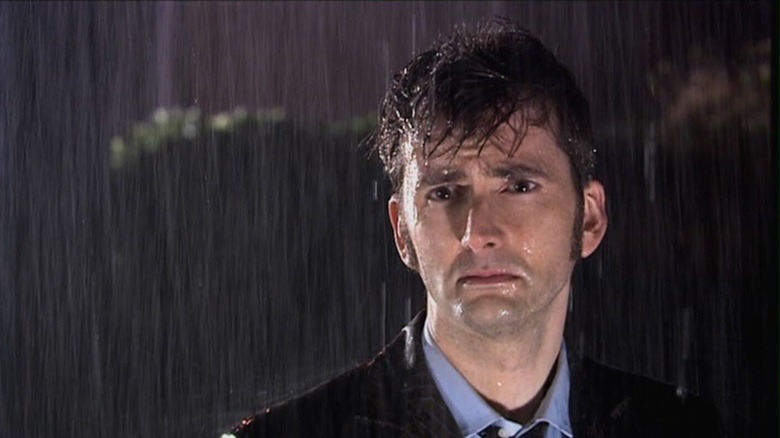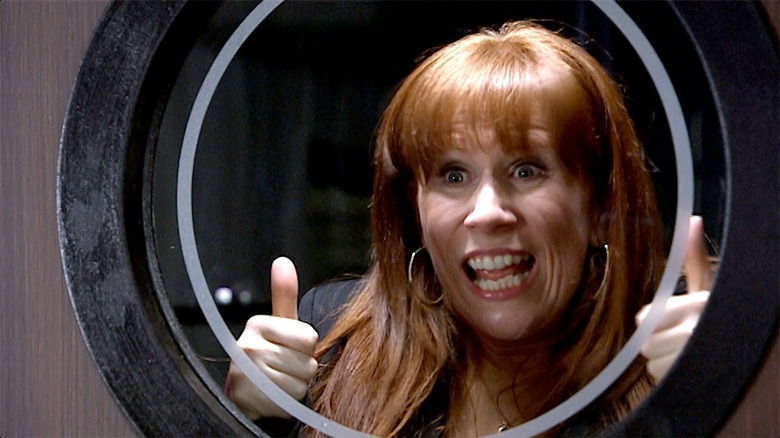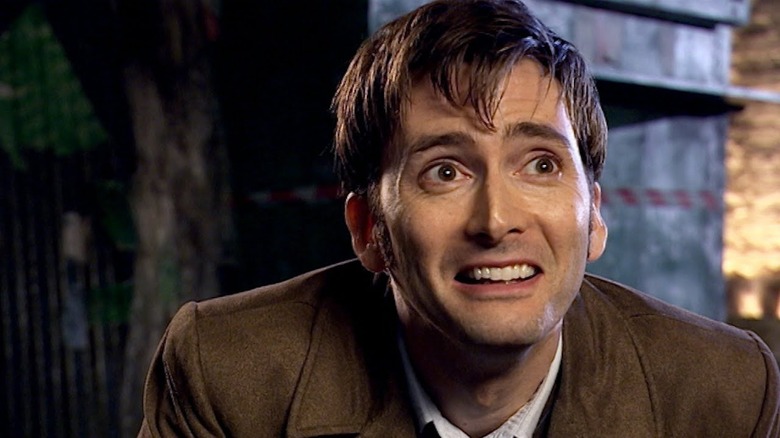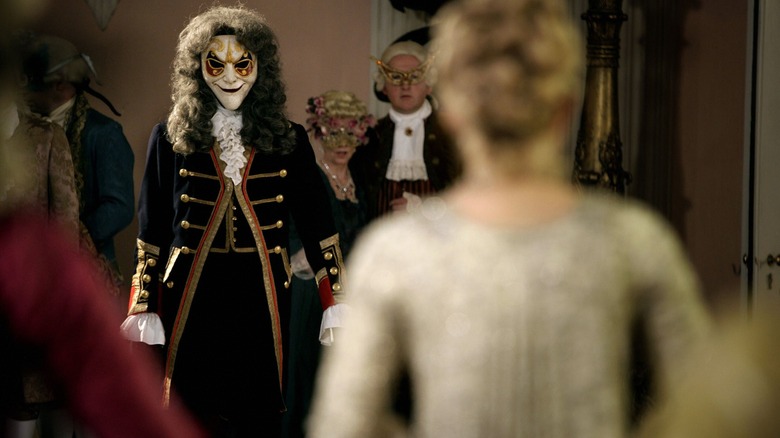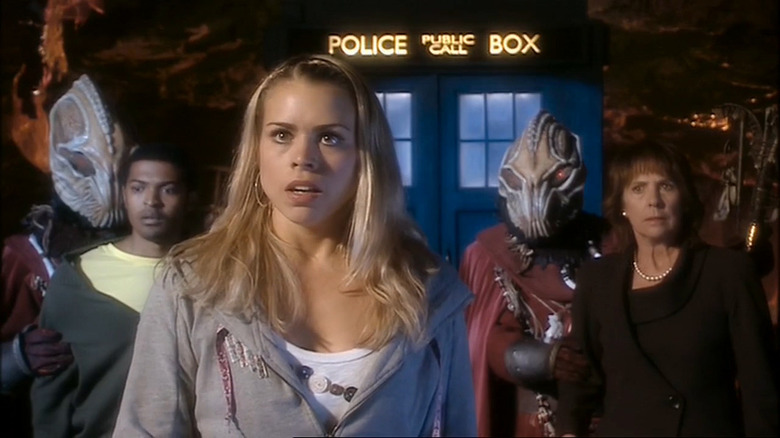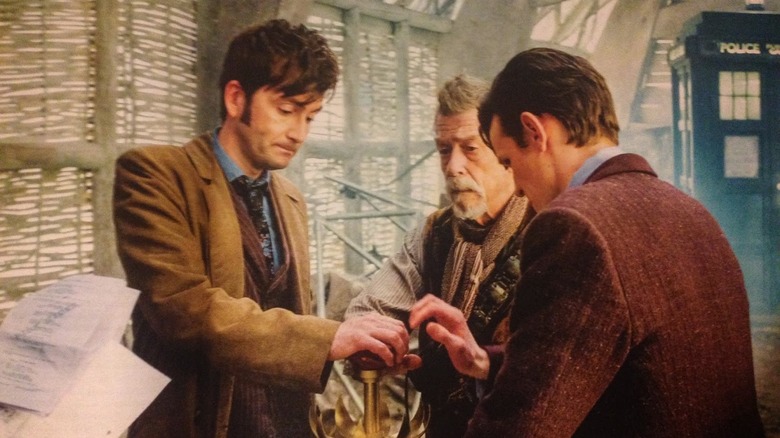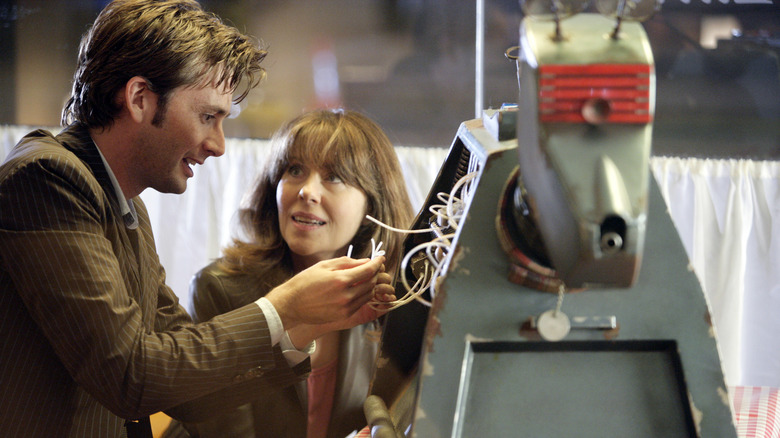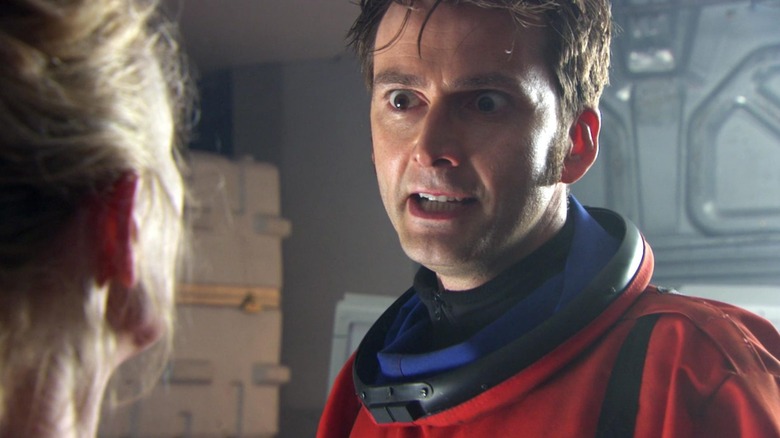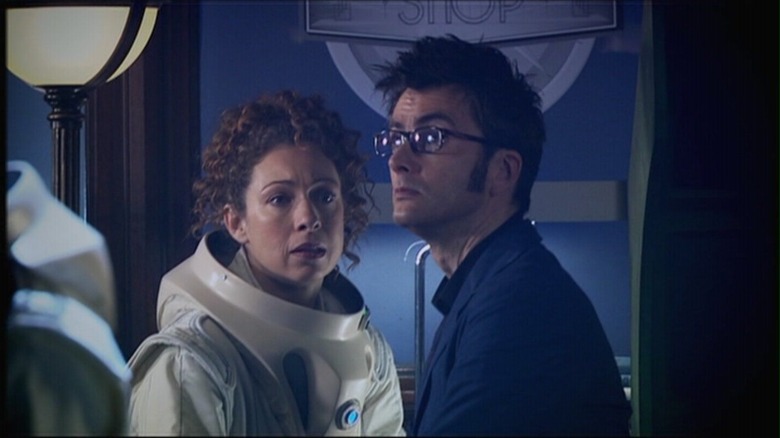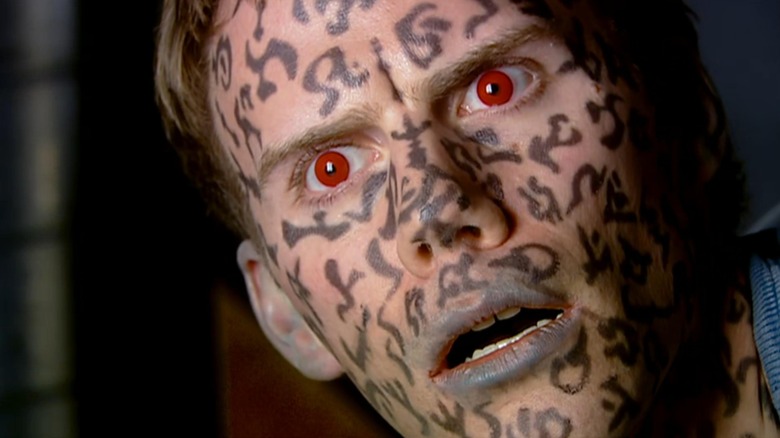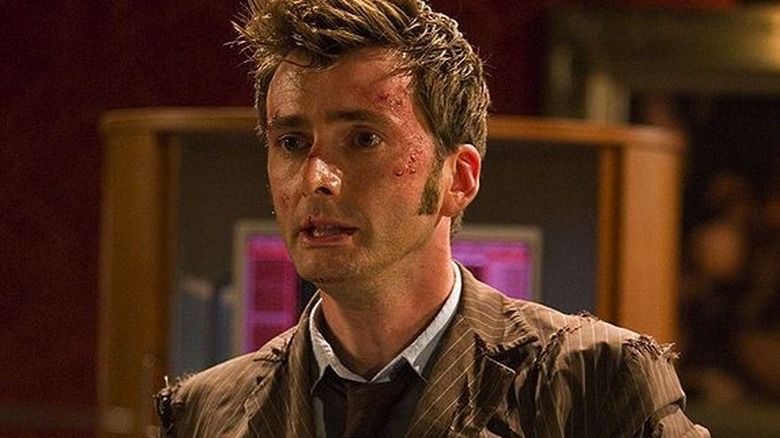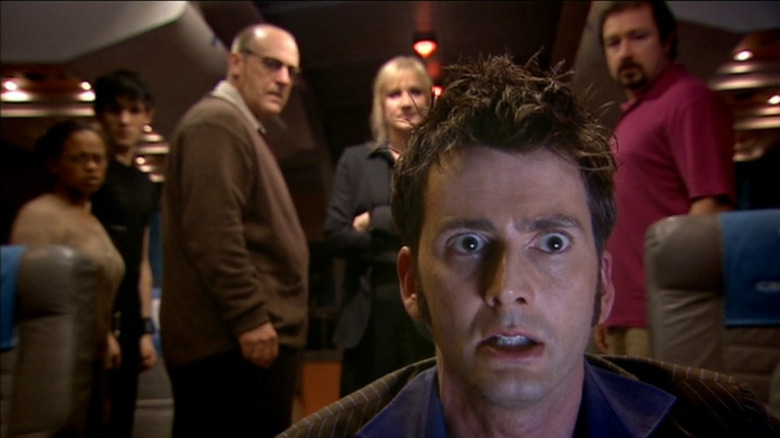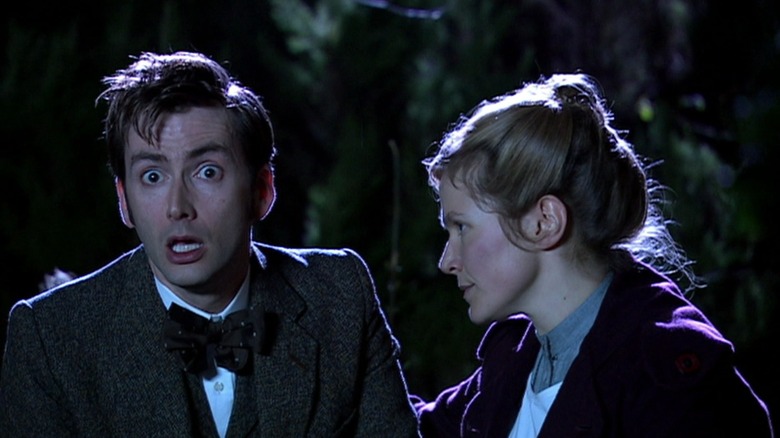The 12 Best David Tennant Doctor Who Episodes, Ranked
It's a good time to be Whovian, especially if you're one of the many fans who found the Russell T. Davies era of the show (airing from 2005 to 2010) to be the best so far. Not only is Davies returning as showrunner, but he's also bringing David Tennant and Catherine Tate back for the 60th anniversary special.
With the return of Tennant to the show, it's worth looking back at some of his best moments as the Tenth Doctor. Tennant held the titular role for three seasons and a series of specials. Not every episode was a winner ("Doctor Who" has always been a tad inconsistent) but if you're looking to make the case for why Tennant's tenure is so beloved, there are plenty of episodes to choose from. So, we've decided to make a list of the 12 best David Tennant episodes. These episodes aren't ranked by their overall quality, so much as how well they highlight the Tenth Doctor's strengths as a character and Tennant's strengths as an actor. So apologies to "Blink" fans, but its Doctor-lite format means it won't be on this list.
12. Partners in Crime
Although most of the episodes on this list are going to be dark stories that highlight Tennant's skill as a serious, dramatic actor, "Partners in Crime" is a good showcase for just how fun and charming Tennant is able to be. The episode reintroduces Donna Noble (Catherine Tate) as the season's companion, as both she and the Doctor are investigating a suspicious weight-loss company without the other. After a couple of near misses, they spot each other while spying on a meeting from two different windows on opposite sides of the room. What follows is a ridiculous silent conversation between the two that lasts over a minute, highlighting the comedic chemistry these two would have throughout the rest of the whole season.
The episode also catches the Doctor at the end of a lonely period of his life. He starts this episode after a stretch of traveling by himself, and is seen here reflecting on the departure of his most recent companion and wondering whether he's being selfish by taking these humans along with him. He nearly rejects Donna in part for this reason, but more than anything he simply doesn't want to be alone again. "Never let the Doctor travel alone" is something that would be repeated a lot throughout the show, especially in Eleven's era, and it's touched on poignantly here.
11. Gridlock
Martha (Freema Agyeman) is an under-appreciated companion. Replacing the first-ever companion of the new series Rose (Billie Piper), she was constantly placed in Rose's shadow by the Doctor in her first few episodes. The fact that she was also introduced as a potential romantic interest — right after the two seasons' long development of Rose and the Doctor as a potential couple — didn't help things either. It's with "Gridlock," however, that the Doctor and Martha finally became a proper team.
This was the episode where the Doctor meets the Face of Boe and he's told, "You are not alone." Near the end of the episode, Martha asks the Doctor what Boe meant by this and the Doctor lies, saying he has no idea. Martha ventures to ask if it meant he's got her, and he somewhat coldly responds "I don't think so." He tries to change the subject and leave, but Martha draws an answer out of him. "I'm not just a Time Lord," he reluctantly tells her. "I'm the last of the Time Lords."
It's not the first time we learned about the Time War and the aftermath of it, but it is one of the first times the Doctor talks about what happened on screen. It's a powerful monologue delivered by Tennant, where we see him decide to let her in on his grief and realize halfway through that he likes having someone to talk to about it with. It also works to finally bring Martha out of Rose's shadow.
10. The Girl in the Fireplace
Largely considered one of the highlights of the season, "The Girl in the Fireplace" follows the Doctor as he keeps popping up in the bedroom of Reneitte (Sophia Myles), a French aristocrat from the 1700s. Although a fairly short amount of time passes for the Doctor throughout the episode, he finds himself showing up throughout Reinette's entire lifetime. At first he meets her as a child, and by the end it's been seven years since her death.
It's a dynamic that episode writer Steven Moffat would return to a lot when he took over the show in 2010, one he's exploring even today, and it's used to great effect here. The Doctor promises to take Reinette travelling through space and time with her, but accidentally leaves her waiting in vain for him to return. And unlike with Amy Pond, there's no time left for the Doctor to make this right.
The circumstances of the episode are extreme, but what happens with the Doctor and Reinette is basically what happens between him and all his companions. He shows up in their lives for what to him feels like a blip, but to them it's the most important, most life-defining thing they've ever experienced. The Doctor keeps on living while everyone he makes a connection with gets old and dies, and you can really feel the toll this takes on him by the end of this episode.
9. The Christmas Invasion
Although every Christmas episode of "Doctor Who" tends to have a nice, character-defining moment for the Doctor, "The Christmas Invasion" is special because its the Tenth Doctor's first proper introduction to the audience. The writers knew that this was a lot of their audience's first time seeing the Doctor regenerate and being played by a new actor, so they dedicated a lot of time to trying to make us feel the confusion and crisis of faith Rose herself was feeling. The Doctor is unconscious for a significant portion of the episode, leaving Rose and the rest of the Earth-bound characters struggling to deal with the episode's main crisis. (The crisis is a surprisingly dark storyline about a bunch of aliens who try to hypnotize two billion people into killing themselves at once.)
The moment the Tenth Doctor wakes up and jumps into the action, however, it becomes clear that Tennant's a worthy replacement for Christopher Eccleston. He's introduced as a more friendly, fast-talking, jittery version of the Doctor than his predecessor, and yet he still has a clear dark side lurking under the surface. He ends up killing the villain of the episode without hesitation, declaring "no second chances," as he walks away. We see his dark side again when he destroys the political career of Harriet Jones (Penelope Wilton) after she has the rest of the aliens killed even as they're leaving. It's the moment that showcases the Tenth Doctor's often self-righteous, black-and-white attitudes around morality, which the show would explore countless times throughout the remainder of his run.
8. The Day of the Doctor
Tennant may not have been the main focus of the 50th anniversary special, but we were certainly happy to have him around. "The Day of the Doctor" introduced him somewhere between the events of "The Water of Mars" and "The End of Time," paying off a four-years-old throwaway line about him marrying Queen Elizabeth. The first half of the episode sees him getting into lighthearted hijinks involving shape-shifting zygons and him squabbling with the Eleventh Doctor, but the second half reintroduces us to Ten's serious side, as he's confronted with the War Doctor (John Hurt) and forced to deal with his decision to end the Time War by killing every single man, woman, and child on the planet Gallifrey.
The story has Hurt's Doctor going through a "Christmas Carol"-esque situation. Before he can press the big genocide button, he has to see his future selves and watch the toll this decision will have on him years and centuries down the line. The Eleventh Doctor's described as the "man who forgets," while the Tenth Doctor's described as "the man who regrets," which is a terrific and succinct description of what makes Tennant so unique among the modern Doctors. Eccleston's Doctor may have been filled with regret as well, but it was with Ten that the show really dove into that feeling with him.
7. School Reunion
Some of the best episodes for any given Doctor is watching him interact with another Doctor's companion, because it's in these episodes that you can really see just how much the Doctor has changed (or hasn't changed) from when that companion knew him. "School Reunion" sees the return of Sarah Jane Smith (Elisabeth Sladen) and deals with the aftermath of Sarah Jane's questionable departure back in the classic show.
Perhaps the biggest change in their relationship compared to the Tom Baker era is that Tennant's Doctor is given more explicitly romantic material. His past relationship with Sarah Jane is written more like a romantic relationship (Sarah Jane accuses him of "dumping" her) than the platonic relationships of the classic show, and the dynamic between Sarah Jane and Rose almost feels like watching the sitcom trope of the current girlfriend meeting the former girlfriend and the two exchanging petty, jealousy-filled digs at each other. Luckily, the episode moves past the more immature aspects of this dynamic early on.
Like with "The Girl in the Fireplace," this episode touches a lot on the loneliness that comes with the Doctor's immortality. "You can spend the rest of your life with me," he says to Rose at one point, "but I can't spend the rest of mine with you. I have to live on, alone. That's the curse of the Time Lords." Here, Rose is forced to reckon with the fact that she will likely never be the most important part of the Doctor's life in the grand scheme of things. If someone as important to him as Sarah Jane was left behind and never mentioned, so could Rose.
6. The Waters of Mars
Widely considered one of the best of the specials leading up to his departure, "The Waters of Mars" shows the Tenth Doctor at his most unhinged. Here, he makes the decision to change history and save the lives of Mia, Yuri, and Adelaide Brookes (Lindsay Duncan), despite the fact that their deaths are a fixed point in time. After years of guilt and grief over the death of the rest of the Time Lords, here the Tenth Doctor embraces the power that comes with being the last of them. "The laws of time are mine," he says with concerning conviction, "and they will obey me!"
Although him successfully saving these people seems like a triumphant moment for a second or two, it quickly becomes clear that the Doctor's going down a bad path. He dismisses the other deaths on the space station as "little people," and Adelaide's disgusted by him. "For a long time now," the Doctor says, "I thought I was just a survivor, but I'm not. I'm the winner. That's who I am. The Time Lord Victorious." It sounds like something the Master would say, not our beloved Doctor.
Adelaide shoots herself soon after, though, and the Tenth Doctor comes crashing down to Earth. The final few minutes see him at his most desperate, realizing both that he's gone too far and that the time for his regeneration is looming over him. "The Waters of Mars" takes the Tenth Doctor as close to losing sight of himself and his ideals as he's ever been, and Tennant more than rises to the challenge of depicting his downward spiral.
5. Silence in the Library/Forest of the Dead
Considering how closely tied River Song (Alex Kingston) is to the Eleventh Doctor, it's fascinating on rewatch to see how she interacts with the Tenth Doctor here. Here, we get to see the Doctor in the fairly unique situation of dealing with someone who knows him far more than he knows her. Tennant gives an amazing performance not just as someone who bounces well off of River Song's character (making it something of a shame that we never got to see these two actors on screen again), but as someone in an increasingly confusing, desperate situation. This two-parter is one of the darkest stories of the whole show so far, and the Tenth Doctor relentlessly forges ahead regardless of how hopeless things seem.
"Forest of the Dead" also features one of the modern Doctor's first moments of using his reputation to save the day. "I'm the Doctor, and you're in the biggest library in the Universe. Look me up," he says to the suit of piranha-like Vashta Nerada aliens that could easily kill him, and they actually listen to him and back up in response. The Doctor has no real way out of the situation, but his reputation and his audacity alone is enough to save himself. This is something we'd see way more often in the Smith years, but it works better here as part of the Tenth Doctor's growing sense of bravado that would turn clearly into a negative quality in "The Water of Mars."
4. The Impossible Planet/The Satan Pit
In addition to being an unnerving, tightly-paced horror story, this two-parter also features the Tenth Doctor at one of his lowest points: at the start of the episode, he's seemingly lost his TARDIS for good. The first 20 minutes or so sees him dealing with implications of no longer being able to travel through time and space, and then the rest of the story centers on something even harder for him to grapple with: the seeming confirmation that the devil itself exists.
"I accept that you exist," the Doctor says to what seems like Satan himself. "I don't have to accept what you are, but your physical existence, I give you that." His faith in science is shaken even more when the creature claims it existed before time itself, and seemingly proves itself capable of seeing into the future.
In the end though, the Doctor embraces the idea that there are still things about the universe he doesn't know or understand, even after his centuries of travel. "Still, that's why I keep traveling," he says at one point, "to be proved wrong."
3. The End of Time
There's a lot to love about Tennant's final story, which provides emotional callbacks to so many of the characters he's met along the way. The Doctor doesn't want to have to regenerate, dreading the moment and treating the event almost like dying for real. Some have criticized the Tenth Doctor in this finale as wallowing a little too much in self-pity, of being afraid of change in a way seemingly antithetical to what "Doctor Who" was about. To some extent, that's fair: among the revival at least, there's never been a Doctor so blatantly reluctant to change faces.
It's also what makes Tennant's Doctor so respectable. Even as we know he doesn't want this, he still goes ahead and does what he needs to when the time comes. When Wilfred knocks those four times and the Doctor realizes what's going to happen, he may lash out for a minute or two, but he still goes ahead and sacrifices his body to save Wilfred's life because that's what the Doctor does.
The Doctor gets to say a final goodbye to Rose, Mickey, Sarah Jane, and so on. Probably the most notable part of the episode is that unlike Smith after him and Eccleston before him, Tennant is alone when he regenerates. It's with the final moments of "End of Time" that revival viewers realized that the Ninth Doctor's confidence in the season 1 finale was most likely a façade. This is probably how scared every Doctor gets when it's time to regenerate; it's just that most of the time they've got a companion they're trying to reassure.
2. Midnight
Like with "Blink" the season before, "Doctor Who" is often at its best when it's working with a shoestring budget, and "Midnight" is another great example. Filmed almost entirely within a single room, this episode features the Doctor trying to keep a group of passengers from killing each other after a mysterious presence enters the spaceship and possesses one of the passengers. The Doctor's dealing with one of the scariest aliens in the whole show, one we never even get to see.
It's one of the show's most stressful, atmospheric episodes, and it's one that leaves the Doctor's faith in humanity momentarily shaken. The monster of the week is defeated not in some heroic, clever manner from the Doctor, but from the hostess sacrificing herself to stop the rest of the crew from throwing a possessed Doctor out into space. At the end the Doctor asks the rest of the passengers if anyone ever even caught the hostess's name, and no one did.
There are some parts of this episode that don't really work. For instance, the creature possessing Sky (Lesley Sharp) is clearly still evil and in control at the end, yet most of the other passengers are still quick to trust her. (Even by the episode's deeply cynical depiction of humans in "Midnight," it still didn't make much sense that even the dumber passengers didn't pick up on any of Sky's red flags.) Even still, those final few moments where the Doctor is haunted by the episode's events, even after the worst is over, features some of his best line deliveries in the whole show.
1. Human Nature/The Family of Blood
This two-parter serves as the best showcase for David Tennant's acting prowess in his whole run. Not only does he play the Doctor at the beginning and the end, but we see Tennant playing a human version of the character (John Smith) who has no knowledge or memory of being a Time Lord. The whole episode has a sense of dread looming over it, not just because Smith is a teacher for students who will all likely be forced to fight in World War I, but because Smith has formed such strong human attachments to those around him. As the alien threat closes in on the school and Martha tries to get him to turn back into the Doctor, Smith is forced to let all of those attachments go.
When the Doctor does return, he's the angriest we've ever seen him. Tennant's Doctor constantly shows his enemies mercy, but having experienced the raw human pain of John Smith, he turns cold and vengeful. He doesn't kill the alien villains; that would be letting them off too easy. Instead he calmly, methodically traps them all in eternal states of torture. The details of it all are a little fuzzy (how exactly does one trap a creature inside every mirror in the universe?), but they don't really matter: it's the Doctor's silent fury that stays with us long after the episode's over. This two-parter shows us the Doctor at his most and least human, and Tennant's bringing it his all the whole way through.
